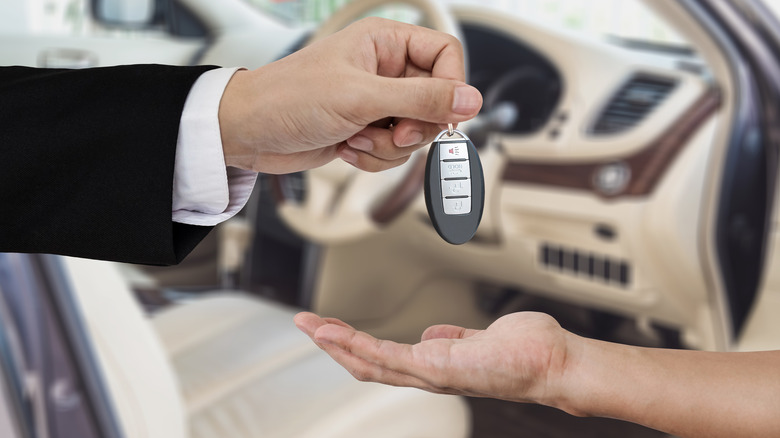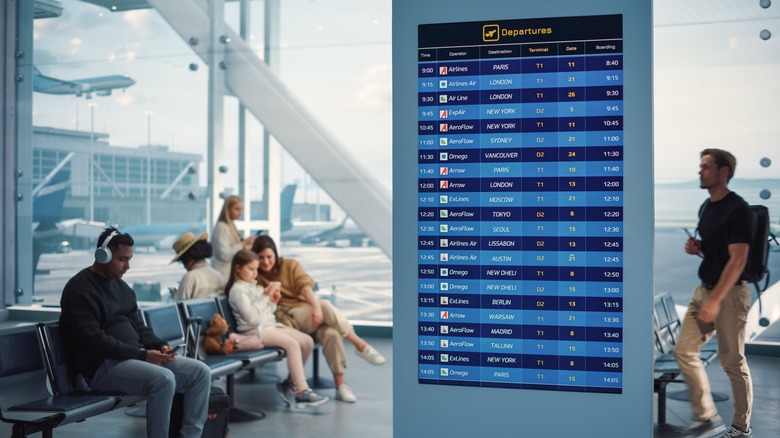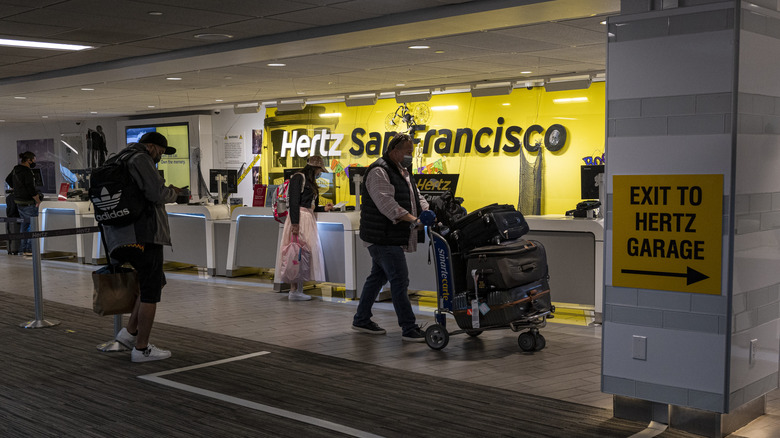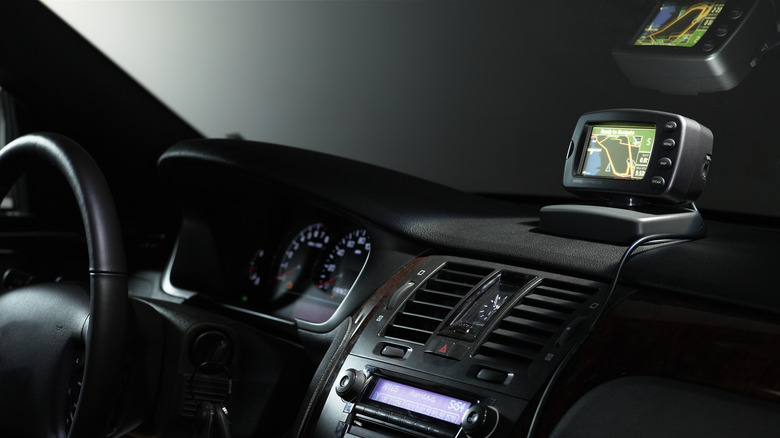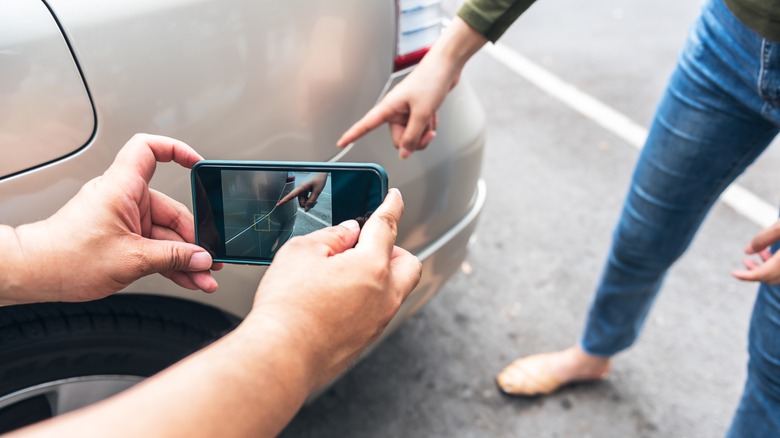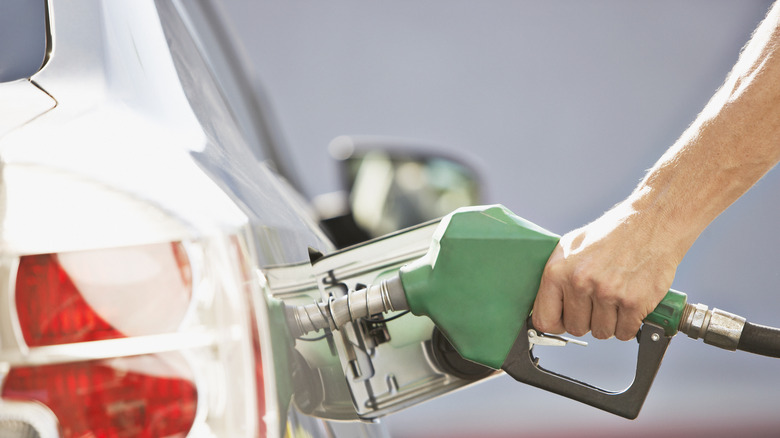Your Guide To Renting A Car For The First Time
Especially since the rise of road trip travel during the COVID-19 pandemic, car rentals have been booming as well. Once you turn 25, that road trip looks a lot different, since you're finally able to join the world of rental cars. What may come as a surprise to first-time renters is that the renting world has a little bit of a learning curve. From knowing what to bring with you, when to rent the car and whether or not you need insurance, there are a lot of considerations.
Often it just takes time to learn that calling ahead to confirm a car rental is a good idea if you book through an online travel agency like Priceline (via The Points Guy). It only takes getting to the counter once and finding out you don't actually have a car to confirm that calling ahead is a wise choice. Similarly, it takes time to know that airport rental spots might be charging up to 25% more for the convenience of location over car rentals from other locations, as reported by Nerd Wallet. In the meantime, read on to get a firm grasp on renting a car for the first time without being ripped off or surprised in the process.
Have all your necessary documents
When picking up your rental car, there are a few documents you will need to provide in order to drive away. If you don't have these things, like a valid driver's license, you won't be renting a car that day. Enterprise, one of the largest U.S. rental car companies, notes that you need three vital pieces of documentation in order to rent: a valid driver's license at least a year old, a valid form of identification, and a credit card that expires more than three months after the car return date. Beyond that, Enterprise reminds drivers that all the documents need to have the same name on them. This is a particularly important point to remember if you have changed your name recently or if you have a business credit card with a different name on it than your legal name.
USA Today reports that some car rental agencies might have different documentation requirements from one another. So before you head out to pick up your rental, be sure to check with your renter to see if they need anything else from you. After all, what you don't want is to fly across the country only to realize you left some important documents on the counter at home!
Check your credit card for insurance coverage
Anytime you rent a car, the rental service will offer you a variety of rental insurance options. Before you sign the dotted line, check with your credit card company to see if your card provides that kind of insurance. If it does, you don't need to pay extra for insurance from your rental company. Even your own car insurance might suffice before your credit card coverage comes into play.
Loretta Worters, the spokeswoman for the Insurance Information Institute, told Nerd Wallet that many people don't know what type of insurance they could get through their credit card. That's why she recommends that customers reach out to their insurance agent and credit card company before signing up for rental car insurance. Any insurance your credit card offers kicks in after your personal auto insurance policy and could even reimburse your insurance deductible. Most of the biggest credit cards companies like Visa and American Express offer some kind of rental car coverage as part of their credit card offerings (via Nerd Wallet).
In order for the credit card insurance to apply, the cardholder needs to be the primary renter of the vehicle, reports CNBC. You also need to decline the renter's collision damage waiver, which covers rental vehicle damage, the outlet further adds. Opting out just means that the rental company is not responsible for any damage the car may endure under your watch, but that will be covered through your credit card or personal insurance policies.
Debit cards may not be accepted
It's a safe rule of thumb to assume you can't use a debit card when renting a car without hassle because a lot of companies only accept them under certain conditions. Before trying to pay with a debit card, figure out if your rental agency allows this. For example, at Enterprise, debit, prepaid and check cards aren't accepted for payments. Debit cards are accepted at airport rental locations with Enterprise if presented with a ticketed return travel itinerary, according to the renter's website.
Scott's Cheap Flights reports that every major U.S. rental car agency accepts debit cards but all of them vary in how they accept them as payment. The outlet says some renters require recent bills, multiple identification forms, or even a credit check before they'll accept a debit card. Some of the rental agencies that allow debit card payments include Avis, Alamo, Hertz, and Thrifty, among others (via Scott's Cheap Flights). If you plan on paying for a rental car with a debit card, be sure to double-check how your rental agency processes those payments so you aren't met with any surprises at the rental desk.
Shop around for rental rates
Picking a rental car is a bit like shopping for Black Friday deals. Everyone has a different price point or sale going on, so it's worth searching around before committing to one particular rental car or company. One of the best ways to save on rental cars is by comparing prices of locations outside of the airport versus airport rental lots because renting at the airport can be much more expensive, according to Nerd Wallet.
Additional charges usually marked as customer facility charges can vary widely depending on where you're renting and who you're renting from. It might make more sense financially to get a ride to an off-airport rental location, but consider the cost of that ride share or taxi when choosing your location, particularly when departing from a major metropolitan area, suggests Nerd Wallet.
Another way to shop around is to check out which rental companies don't include a drop fee for one-way rentals, says Auto Slash. According to the outlet, smaller companies like Advantage will have smaller or no drop fees at all for doing one-way rentals instead of roundtrip. Some companies might even have great rates on one-way rentals too, so just keep your options open when shopping around.
Look for discounts
Depending on what kinds of organizations you're a part of, you might score some pretty substantial rental car discounts. Organizations like AAA, AARP, and even Costco offer myriad discount options for car rental companies, per Nerd Wallet. The outlet also notes that sites like Auto Slash help travelers do comparative searches for the best price or available discounts, so if you aren't part of a program with discounts, you might still find some online.
One of the easiest ways to score a rental car deal is to utilize corporate codes from your work or even your alma mater. Even if you're not currently a student, you might be able to get alumni discounts and other perks through your previous university, the outlet adds. For example, you might be able to get the extra driver fee waived through particular corporate or university codes. Don't utilize any codes that you cannot verify your eligibility for, advises TPG. If you can't prove a connection to a university but try to use that university code, they might ask for identification and deny the discount if you don't have it. If you are eligible, however, take advantage of those discounts. Every little bit helps, especially when fees are tacked on per day.
If you're delayed, your car might get rented out
Rental car companies are still businesses, so if you don't show up around the time you say you will be there to get your car, there's a good chance they'll rent it to someone else. At airport Hertz locations, for example, any cars not picked up by 11:59 p.m. or by closing time, the reservation will no longer be held. At off-airport locations, however, the reservation is only held for two hours past the pickup time, unless the traveler calls the agency to let them know to change the time (via Hertz).
If you don't let the rental agency know you're running late, they could assume you're a no-show and cancel your rental, which also means you will not be refunded, according to Rental Cars. One way to avoid this, especially if you're flying in, is to provide the rental agency with your flight number. That way they'll know you're running late even if you cannot call them because you're still soaring at 20,000 feet (via Rental Cars). Just let your rental company know if you're aware of any personal delays and save yourself from a headache later on.
Try to book early
As with flights, it's a good idea to book your car rental in advance to not get slammed with last-minute fees. Not only are cars more likely to be cheaper if you book early, but there's also a better chance you get the car you want. If you plan on renting a car during a heavy tourist season, keep in mind that you'll want to book as far in advance as possible to ensure you get the car you desire. Most rental companies operate with limited fleets, so the estimated demand for each car might be calculated weeks or months in advance.
Even booking just three days ahead of time instead of trying to rent a car on the day of your arrival will save you money, according to research from Nerd Wallet. And while booking early has been the norm for savings benefits, it's not always true, the outlet's research discovered. But it's worth checking in on your rental price options starting early to make sure you're getting the best deal. The less money spent on renting means more money for fun.
Think twice about add-ons
Getting asked about add-ons at the counter when picking up your rental car or online when you're booking it is commonplace in the rental market. But just because the GPS add-ons or additional driver benefit upgrades are offered doesn't mean you need to shell out the extra cash for them. Those extras can add up fast and even double the cost of renting your car, reports Smarter Travel. When it comes to add-ons like an in-car GPS, it's likely you don't need that because your phone has a built-in GPS already.
According to Allianz Travel Insurance, the biggest rental car up-sells are upgrading to a larger vehicle, adding rental insurance, tank fill-ups, toll fees and inadvertently agreeing to additional insurance even after declining. When 10% of rental car revenue is found in those add-ons, it's no wonder they can sometimes be a hard sell at the counter (via Allianz). Car rental folks don't always hard sell the add-ons, but it can happen. Just be prepared to say "no" if they aren't things you need or want.
You may need a special permit if abroad
If you are planning on driving a rental car outside of the United States, it's possible you will need a special driving permit. It's crucial that you know whether or not you need a special permit before traveling abroad to give yourself enough time to obtain one. Per the U.S. Department of State and Bureau of Consular Affairs, a lot of countries don't recognize a U.S. driver's license and drivers will instead need an International Driving Permit. The agency says that travelers can obtain IDPs through AAA before departure but need to make sure they're valid as long as needed while traveling.
Not all locations abroad require an IDP. Some will accept a valid U.S. driving license, according to International Citizens. Those countries include Ireland, the United Kingdom, South Africa, Canada, and Mexico. If you happen to have a European driver's license, you also do not need an additional license if you plan on driving in EU countries (via International Citizens). These permits are only $20 and good for one year or until your driver's license expires if that is less than a year away, the site adds. You will also need two passport-style photos for your ID, adds International Citizens.
Take photos of the car
Anytime you pick up or drop off a rental car, you need to take photos of the vehicle for insurance purposes. Especially if the car has dings or scratches upon pick up, you want to document the existing damage so the company does not come after you to pay for it later. Even if the damages appear small, be sure to document them, suggests Million Mile Secrets. Not only that but the outlet suggests emailing the photos to yourself after taking them so you can keep track of them since rental agencies don't usually bill for damages until a few months post-rental.
It's crucial to also take pictures of things like the gas gauge to protect yourself against additional charges, advises Live and Lets Fly. Per the outlet, it's possible for a rental car company to charge for gas even if you filled the tank without proof to show that you did your due diligence in gassing up the car. While you're documenting the fuel fill, also take photos of any damage you see inside the vehicle as well. After all, the company could easily charge you for dings on the interior just as easily as they could the exterior of the vehicle.
Always remember to gas up yourself
Renters often skip pre-paying for gas at the counter because it's cheaper to fill the tank yourself, but that can be a costly gamble if you're a forgetful person. If you bring a rental car back without matching the fuel level where it was when you picked it up, the company will charge you significantly more to make up the difference. But pre-paying for gas means you're also paying for a full tank of gas at the renter's pricing discretion, which is often inflated by 50 cents per gallon or more, according to Auto Slash. Not to mention that pre-paying gas prices are based on the prices where you are picking the car up from which could be different from where you're dropping off, so filling up on your own makes more sense in that case too, the site adds.
The only times it really makes sense to prepay for gas is if you are returning it too early or late to access open gas stations or if you're unfamiliar with the area and don't want to worry about it, says Your Mileage May Vary. Still, putting gas in the car yourself means you're just paying for the gas you've used, not the gas that's still in the tank when you drop it off. Prepaying for gas is more about convenience than saving money.




